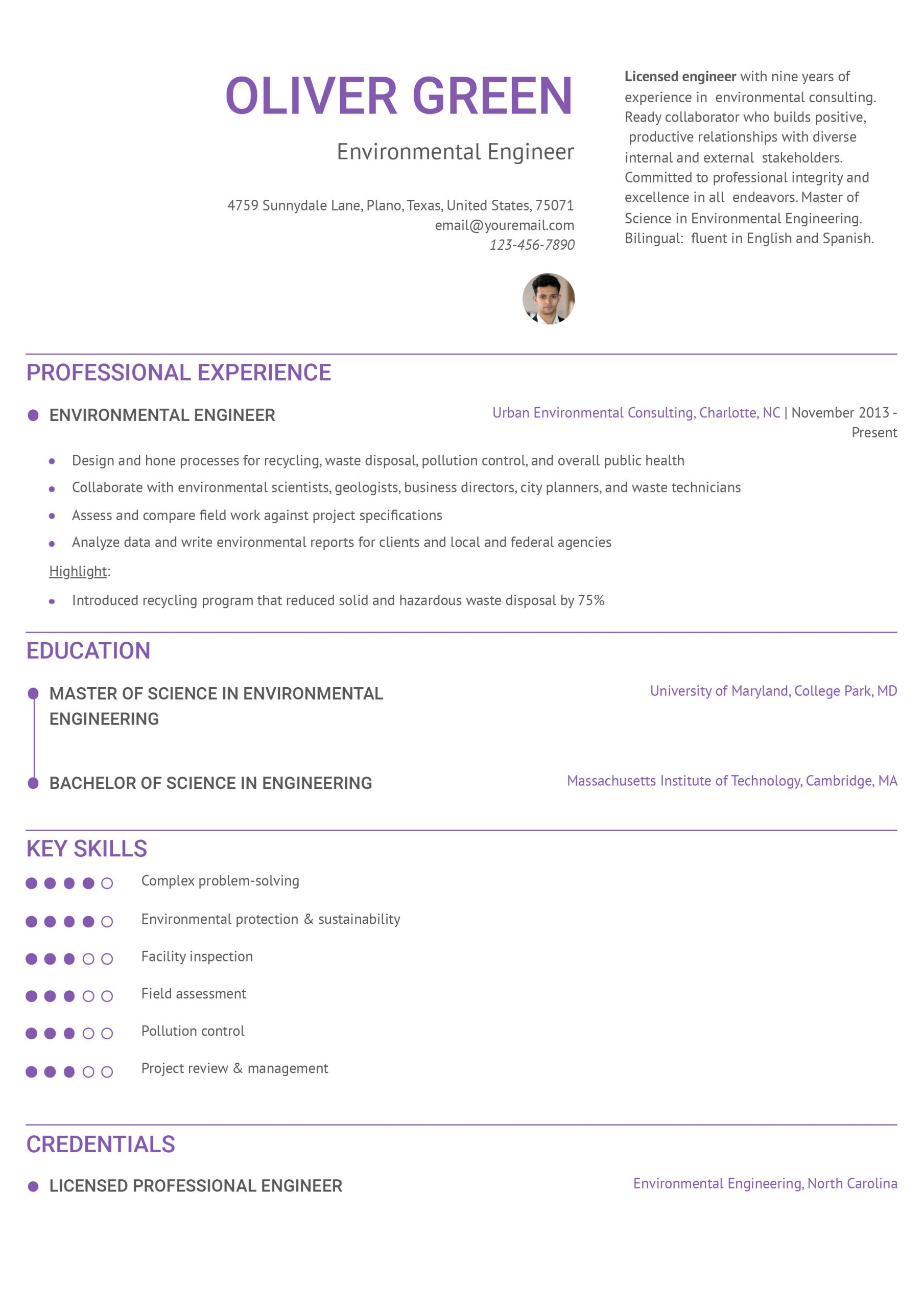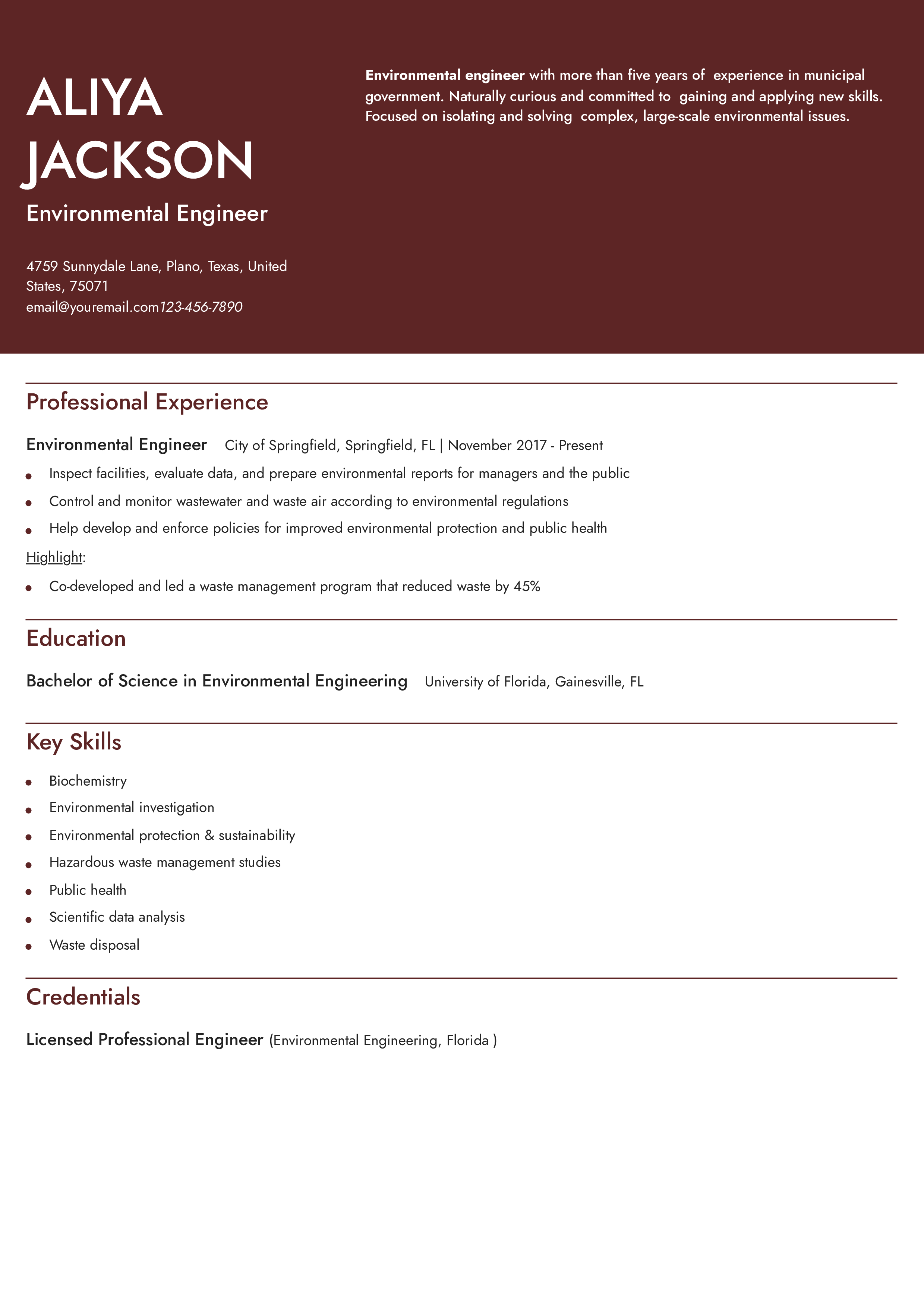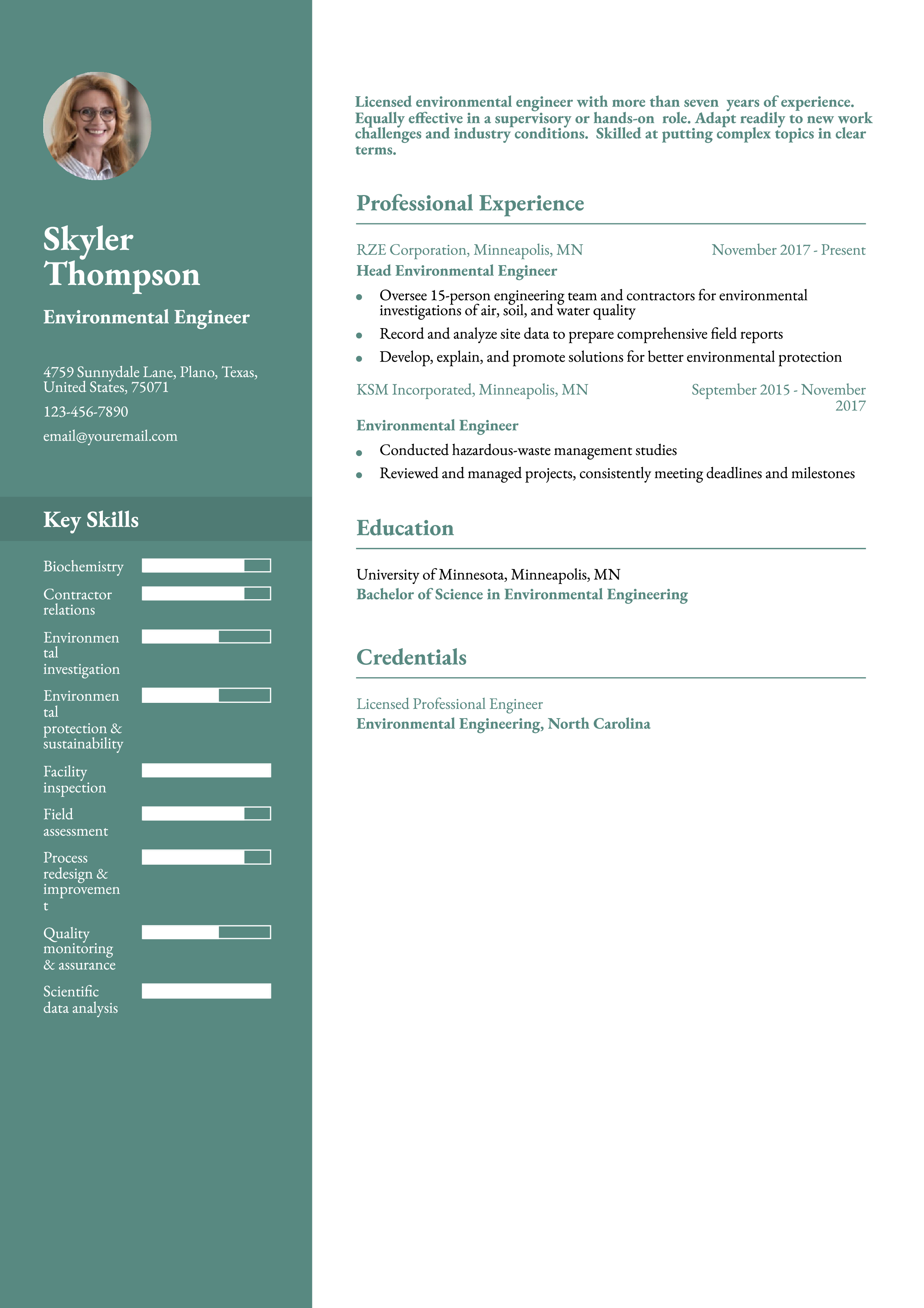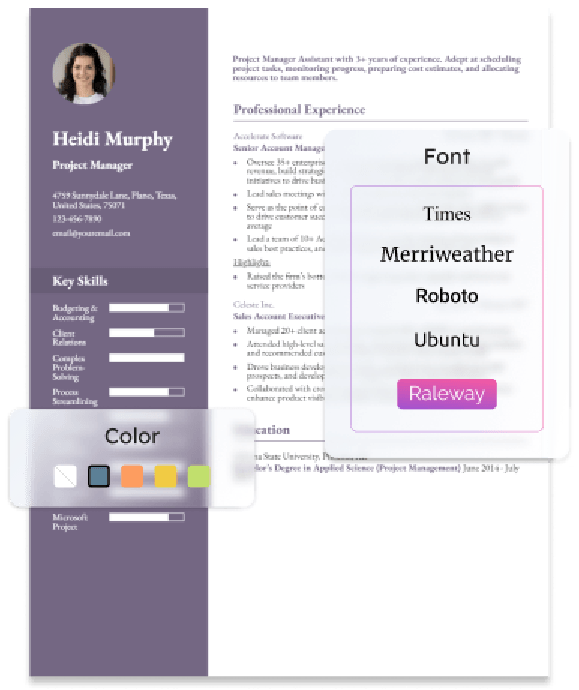- Entry-Level
- Mid-career
- Senior-level
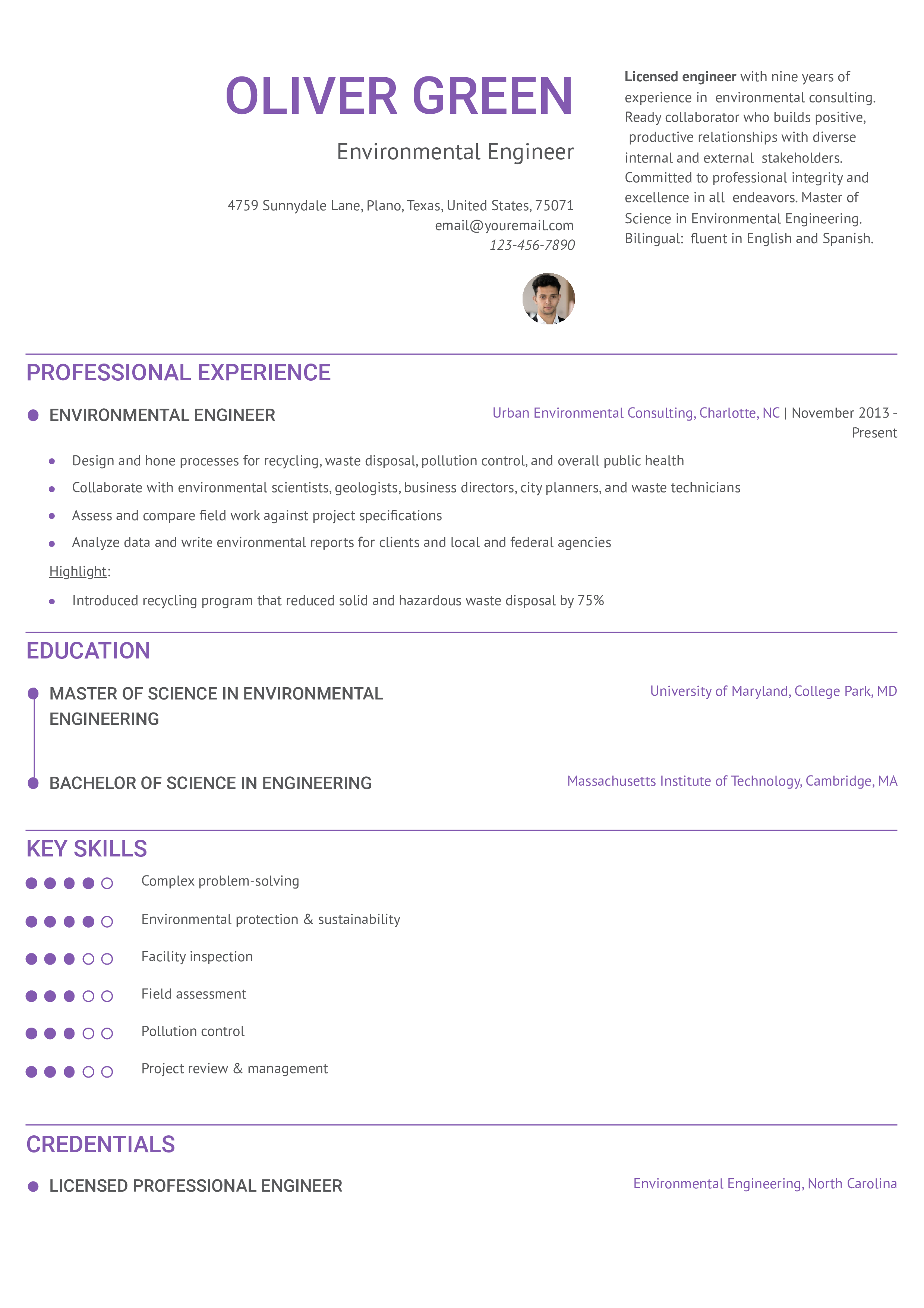
Environmental Engineer Text-Only Resume Templates and Examples
Oliver Green
1221 Victoria Street, Charlotte, NC 93402 | (989) 876-5454 | [email protected]
Licensed engineer with nine years of experience in environmental consulting. Ready collaborator who builds positive, productive relationships with diverse internal and external stakeholders. Committed to professional integrity and excellence in all endeavors. Master of Science in Environmental Engineering. Bilingual: fluent in English and Spanish.
Key Skills- Biochemistry
- Complex problem-solving
- Cross-functional collaboration
- Customer relations
- Environmental investigation
- Environmental protection & sustainability
- Facility inspection
- Field assessment
- Hazardous waste management studies
- Leadership consulting
- Policy development & enforcement
- Pollution control
- Process redesign & improvement
- Program development
- Project review & management
- Public health
- Quality monitoring & assurance
- Recycling improvement
- Regulatory compliance
- Reporting & documentation
- Scientific data analysis
- Waste disposal
Environmental Engineer, Urban Environmental Consulting, Charlotte, NC | November 2013
- Design and hone processes for recycling, waste disposal, pollution control, and overall public health
- Collaborate with environmental scientists, geologists, business directors, city planners, and waste technicians
- Assess and compare field work against project specifications
- Analyze data and write environmental reports for clients and local and federal agencies
Highlight:
- Introduced recycling program that reduced solid and hazardous waste disposal by 75%
- Master of Science in Environmental Engineering, University of Maryland, College Park, MD
- Bachelor of Science in Engineering, Massachusetts Institute of Technology, Cambridge, MA
- Licensed Professional Engineer – Environmental Engineering, North Carolina
Fluency in Spanish | Proficiency in Italian
How To Write an Environmental Engineer Resume
If you’re aiming for an environmental engineer position, craft a resume that showcases your ability to analyze data, perform site inspections, and collaborate with science teams. Tell your unique story as an engineer using tangible examples from your career. In this guide, we provide valuable tips and insights to help translate your professional experience into an accomplishment-driven resume.
1. Craft an outstanding profile with a summary of your environmental engineer qualifications
Getting to the main point right away in a short resume profile can help your resume reader take notice of your value. Share three to five specializations along with a summary of your experience in environmental engineering to prompt the recruiter to keep reading.
For example, if you helped design new recycling and waste disposal processes for large companies or have conducted hazardous-waste management studies, highlight those experiences in your profile. The key is to share items that will differentiate you from the competition and increase your chances of landing the interview.
Profile Example #1
Environmental engineer with more than five years of experience in municipal government. Naturally curious and committed to gaining and applying new skills. Focused on isolating and solving complex, large-scale environmental issues.
Profile Example #2
Licensed engineer with nine years of experience in environmental consulting. Ready collaborator who builds positive, productive relationships with diverse internal and external stakeholders. Committed to professional integrity and excellence in all endeavors. Master of Science in Environmental Engineering. Bilingual: fluent in English and Spanish.
2. Add your environmental engineer experience with compelling examples
The professional experience section of your resume is where you get to list in bullet form all of the major accomplishments (not duties) of your job history. Focus on achievements and the results and value that your work has provided to your employers.
For environmental engineers, that could mean emphasizing your ability to develop and implement policies or that you led a large engineering team to complete a project. Be sure to showcase your knowledge of environmental protection, regulations, and sustainability.
Professional Experience Example #1
Environmental Engineer, City of Springfield, Springfield, FL | November 2017–Present
- Inspect facilities, evaluate data, and prepare environmental reports for managers and the public
- Control and monitor wastewater and waste air according to environmental regulations
- Help develop and enforce policies for improved environmental protection and public health
Highlight:
- Co-developed and led a waste management program that reduced waste by 45%
Professional Experience Example #2
Environmental Engineer, Urban Environmental Consulting, Charlotte, NC | November 2013
- Design and hone processes for recycling, waste disposal, pollution control, and overall public health
- Collaborate with environmental scientists, geologists, business directors, city planners, and waste technicians
- Assess and compare field work against project specifications
- Analyze data and write environmental reports for clients and local and federal agencies
Highlight:
- Introduced recycling program that reduced solid and hazardous waste disposal by 75%
3. Include education and certifications relevant to environmental engineers
Employers seeking environmental engineers almost always require at least a bachelor’s degree. In some cases, you’ll also need to show you have relevant certifications or licenses. Obtaining additional industry credentials won’t guarantee you a job interview, but it can help to further establish your credibility within your field.
Education
Template
- [Degree Name]
- [School Name], [City, State Abbreviation] | [Graduation Year]
Example
- Master of Science in Environmental Engineering
- University of Maryland, College Park, MD | 2019
Certifications
Template
- [License Name], [State], [Completion Year]
Example
- Licensed Professional Engineer – Environmental Engineering, North Carolina | 2017
4. List key skills and proficiencies for environmental engineers
Before you can make a great impression with a job recruiter or hiring manager, you may have to get your resume past an applicant tracking system (ATS). These systems are used to screen applications by looking for qualified candidates who list matching skills to the job postings. Incorporating the right keywords from the job description directly into your profile, professional experience, and skills section is so important. To help get you started, here is a list of common keywords used in environmental engineer job postings:
| Key Skills and Proficiencies | |
|---|---|
| Biochemistry | Complex problem-solving |
| Cross-functional collaboration | Environmental investigation |
| Environmental protection and sustainability | Facility inspection |
| Field assessment | Hazardous-waste management studies |
| Policy development and enforcement | Pollution control |
| Process redesign and improvement | Program development |
| Project review and management | Public health |
| Quality monitoring and assurance | Recycling improvement |
| Regulatory compliance | Reporting and documentation |
| Scientific data analysis | Waste disposal |
How To Pick the Best Environmental Engineer Resume Template
The content of your resume is always going to be more impactful than the look of it. That said, for environmental engineer jobs, choose a template that looks clean and organized, and emphasizes your professional accomplishments and key skills in an easy-to-read format. Avoid overly decorative fonts, flashy colors, and graphics that may distract the reader from your qualifications and experience.
Frequently Asked Questions: Environmental Engineering Resume Examples and Advice
How do I optimize my Environmental Engineering CV to get noticed by hiring managers?-
To optimize your Environmental Engineering CV, begin by showcasing measurable achievements that demonstrate the value you’ve brought to previous employers. Use action verbs and specific examples to highlight your contributions. Incorporating industry-specific keywords, particularly in the skills and professional experience sections, will help your CV stand out, especially with ATS systems.
What are common action verbs for environmental engineering resumes?-
It’s easy to get stuck when writing the professional experience section of a resume. You might run out of action verbs to describe your work, especially as an engineer. Incorporating a mix of action verbs can greatly enhance the readability of your bullet points. We’ve compiled a list of action verbs you can use to build your resume:
| Action Verbs | |
|---|---|
| Analyze | Assess |
| Collaborate | Control |
| Design | Document |
| Ensure | Evaluate |
| Improve | Inspect |
| Maintain | Mitigate |
| Prepare | Protect |
| Reduce | Report |
| Resolve | Review |
| Study | Update |
How do you align your resume with an environmental engineering job description?-
The Bureau of Labor Statistics forecasts that jobs for environmental engineers will increase by about 6% between 2022 and 2032, which is faster than average across all occupations. To be selected for a job in this growing field, it’s important to tailor your resume for each organization you are targeting.
When you find a job posting that intrigues you, focus on the details provided about the hiring organization. What are the employer’s stated values? Do they overlap with your own? Or are they looking for a particular expertise or skill set like data analytics or dealing with hazardous materials? If so, mention that in your resume’s profile section. Doing so will make your resume more specific to the job at hand and will increase the likelihood of attracting the hiring manager’s notice.
What is the best environmental engineering resume format?-
Chronological or combination resume formats are recommended for environmental engineers. These formats provide a clear picture of your qualifications, making it easier for employers to evaluate your suitability for accounting roles.
In a chronological resume, your work history is presented in reverse order, showcasing your career progression and demonstrating your commitment and growth in accounting roles. Alternatively, the combination format combines the chronological and functional approaches, enabling you to emphasize your work history and key skills upfront.
Should my environmental engineering resume be one or two pages?-
Your environmental engineering resume should ideally be one page, especially if you have fewer than 10 years of experience. A two-page resume can be effective for seasoned professionals with a longer track record if it highlights accomplishments and skills directly relevant to the job. Every detail should add value and strengthen your candidacy.
Limit your work experience to the past 10 to 15 years, unless earlier positions are highly relevant. Keeping your resume concise and targeted will make a strong and memorable impression on potential employers.
Craft your perfect resume in minutes
Get 2x more interviews with Resume Builder. Access Pro Plan features for a limited time!

